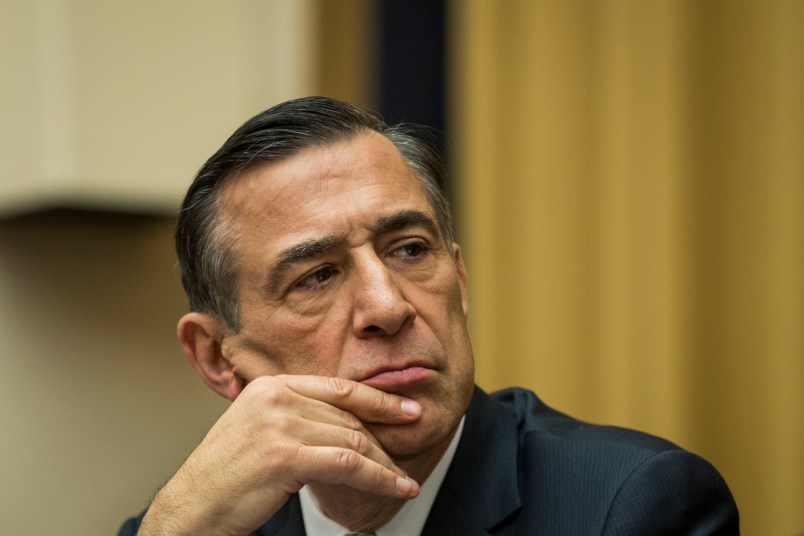Just weeks ago, Rep. Darrel Issa (R-CA) told TPM that he thought two Republicans would make it into the runoff election for his seat, locking out Democrats and costing them one of their top pickup opportunities. But this week, he said he thinks that isn’t going to happen.
“The Democratic turnout is exceeding Republican in the absentee [mail vote],” Issa, who is retiring at the end of this term, told TPM on Tuesday. “The Democrats have a machine turning out Democratic votes and that’s probably going to make a difference on June 5 … what they’re doing is designed to make what would otherwise be a failure into a success.”
According to new early vote numbers, Issa is right that that’s less likely to happen in his district. But the numbers suggest Democrats may be in a precarious spot in a few other California districts they’ve been worried about.
Those numbers are compiled by data guru Paul Mitchell, whose team reaches out to each county to get daily vote updates. He said the early data suggested that the electorate is looking a lot more like a normal midterm electorate in the state than one where Democrats are flocking to the polls — a sign that it might be harder to flip these traditionally Republican but Democratic-trending seats in the fall than some Democrats have hoped.
“It’s all bad signs,” he said. “I don’t think these early vote numbers suggest a big blue wave in the primary.”
California’s “jungle” primary system allows the top two vote-winners to advance to the general election, regardless of party. That’s led to concerns among Democrats that their candidates could split the Democratic vote, allowing Republicans to finish in the top two spots in some congressional races.
In Issa’s seat, where four serious Democratic candidates are vying against three Republicans, Democrats are outpacing Republicans in early mail ballots returned — a big factor in the race as California strategists say at least two thirds of the election’s votes will be cast by mail. Registered Democrats make up 32 percent of the district’s vote-by-mail population but have returned 36 percent of its votes, while Republicans’ returned ballots have matched their 37 percent share of the electorate.
That’s not the case in another key race where Democrats are concerned they might get shut out — a Democratic-leaning district held by retiring Rep. Ed Royce (R-CA) where three Democrats including two front-runners are squaring off against a trio of Republicans. And while Democratic strategists who have seen internal polling say this district isn’t at the top of their worry list, the numbers suggest there’s reason for concern here as well, as Republicans are voting at faster numbers than Democrats.
In Royce’s district, registered Democrats make up 34 percent of the vote-by-mail population, the same percentage that have returned ballots. But Republicans, who make up 37 percent of the vote-by-mail population, have returned 46 percent of the ballots received so far.
Rep. Dana Rohrabacher’s GOP-leaning seat more closely mirrors the registered vote population. Democrats make up 30 percent of vote-by-mail registrants and 35 percent of those ballots returned, while Republicans make up for 42 percent of the district’s mail voters and 46 percent of those who have returned ballots.
It’s still relatively early in the election — ballots were sent out in early May, voters have until the June 5 primary to return them. Since there are more competitive Democratic than Republican primaries (including all-party races for governor and senator) Democrats may be more likely to sit on ballots for longer. Different campaigns have different vote-gathering strategies as well, so one shouldn’t over-read these results. But they can be instructive.
Mitchell is a Democrat but his clients include both the California Democratic and Republican parties. He thinks the likelihood of Democrats getting locked out in any particular district remains low — but says there’s a good chance they’ll blow one race, a costly mistake in a year where every seat counts as Democrats try to win back the House majority.
“I believe it’s an unlikely event for this to happen in any one district but if you take five unlikely events you end up with one fairly likely event,” he told TPM.
Democrats are doing everything they can to avoid that situation, pouring millions of dollars into a number of districts to tear down some Republicans and boost some Democrats. Republicans have been surprisingly quiet in those races, considering how with some effort now they could guarantee victory in a few key House battles — as well as save themselves a lot of money down the line (though there have been some last-minute efforts by GOP outside groups).







What idiot came up with the idea of jungle primaries?
When are the idiots in California going to scrap them?
They are profoundly undemocratic. If Californians want to experiment with voting reform, then try proportional representation, there are several flavors. Try Ireland’s single transferable vote system, for example, which has worked to ensure electoral representation reflecting the popular vote for the last century.
This was Arnold’s gift to the GOP.
Well, it is still possible that dems will turn out stronger on primary day itself. We shall see.
What big blue wave?
Way too much bed-wetting going on in this article. I find it hard to believe that Californian Dems are mysteriously less motivated to change the status quo than Dems elsewhere. I find it easy to believe that the jungle primary system has led a lot of Dems to wait until clear frontrunners have emerged before casting their vote. Much better to wait until the last minute, in such a system. Also, November is a long way off.